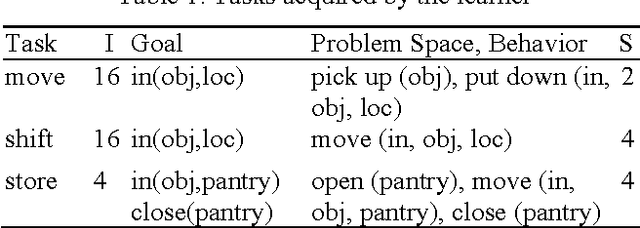John Laird
A Proposal to Extend the Common Model of Cognition with Metacognition
Jun 09, 2025Abstract:The Common Model of Cognition (CMC) provides an abstract characterization of the structure and processing required by a cognitive architecture for human-like minds. We propose a unified approach to integrating metacognition within the CMC. We propose that metacognition involves reasoning over explicit representations of an agent's cognitive capabilities and processes in working memory. Our proposal exploits the existing cognitive capabilities of the CMC, making minimal extensions in the structure and information available within working memory. We provide examples of metacognition within our proposal.
A Computational Model for Situated Task Learning with Interactive Instruction
Apr 23, 2016



Abstract:Learning novel tasks is a complex cognitive activity requiring the learner to acquire diverse declarative and procedural knowledge. Prior ACT-R models of acquiring task knowledge from instruction focused on learning procedural knowledge from declarative instructions encoded in semantic memory. In this paper, we identify the requirements for designing compu- tational models that learn task knowledge from situated task- oriented interactions with an expert and then describe and evaluate a model of learning from situated interactive instruc- tion that is implemented in the Soar cognitive architecture.
Towards an Indexical Model of Situated Language Comprehension for Cognitive Agents in Physical Worlds
Apr 09, 2016


Abstract:We propose a computational model of situated language comprehension based on the Indexical Hypothesis that generates meaning representations by translating amodal linguistic symbols to modal representations of beliefs, knowledge, and experience external to the linguistic system. This Indexical Model incorporates multiple information sources, including perceptions, domain knowledge, and short-term and long-term experiences during comprehension. We show that exploiting diverse information sources can alleviate ambiguities that arise from contextual use of underspecific referring expressions and unexpressed argument alternations of verbs. The model is being used to support linguistic interactions in Rosie, an agent implemented in Soar that learns from instruction.
 Add to Chrome
Add to Chrome Add to Firefox
Add to Firefox Add to Edge
Add to Edge